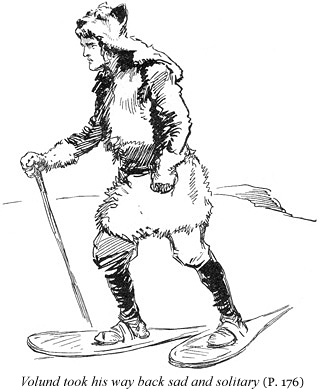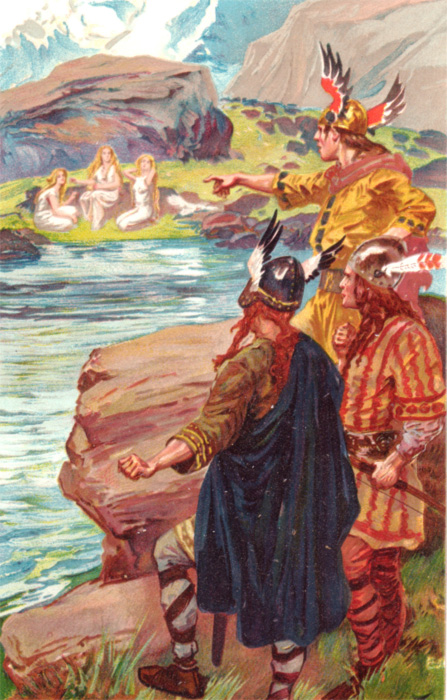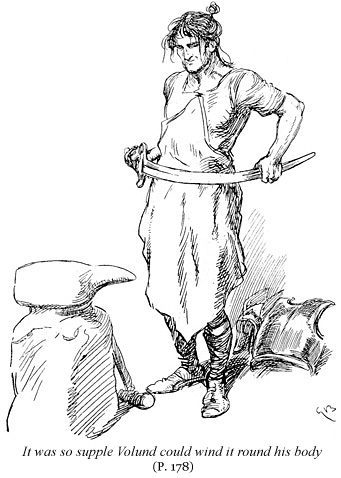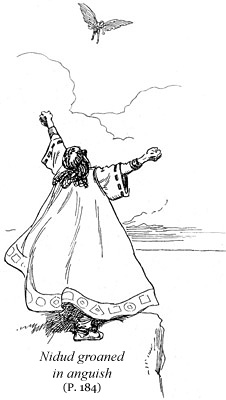|
THE STORY OF VOLUNDThere was a King of the Finns who had three sons, named Slagfinn, Egil, and Volund. Handsome and tall, straight-limbed and brave were they all, and mighty hunters of wild beasts. Over the frozen land they would go on their snow-shoes, seeking their prey, journeying sometimes for days together, and resting at night wrapped in their reindeer skins. And once they travelled southward to the land of Sweden, and it befell that after many days they came to a lake in a place called Wolfsdale, because of the many wolves that hid there. But the brothers had no fear of wolves, and they set about building them a house on the shores of the lake. And all the winter they abode there, hunting bears, and catching fish through the holes which they made in the ice-covered lake. And then the spring came. And early one morning they saw on the margin of the lake three maidens sitting and spinning flax. And the brothers looked and looked again, for they deemed they must be dreaming, so beautiful were the maidens. Blue were their eyes as the sky above them; white their skins as the snow upon the mountains; and their shining tresses covered their shoulders with a mantle of gold. And when the brothers drew nearer, they saw that beside each maiden was a swan-plumage. Then |
|
did they know that the maidens were Valkyrjor, goddesses who choose the warriors who shall be slain in battle, and who welcome them after death and serve them in Odin’s Valhalla. And the brothers gazed at them in wonder, for often had they heard and dreamed of the surpassing loveliness of the Valkyrjor, and as they gazed, the three maidens ceased spinning, and looked smilingly upon them. And they rose and came towards the young men where they stood unable to move, and each one cried “Hall!” to one of the brothers, calling him by his name. And Slagfinn took the outstretched hand of the maiden who had hailed him, and her name was Svanvhit. And Egil took the hand of Olrun, and Volund, Alvit. And they loved each other with a great love, and they were wedded. And the brothers took their brides to the house beside the lake, and great was their happiness. Now it was the will of the gods that for only nine years at a time might a Valkyrjor live this life of earthly joy: after nine years she must return to the battle-field and the service of Valhalla for another nine years. So in the seventh year of their life with the brothers, the swan-maidens grew sad, in the eighth year they were restless, and in the ninth they resigned themselves to their fate, and prepared to depart. And one morning, when the brothers had gone forth to the chase, they donned their swan-plumage and flew away. And the brothers returned and found their home empty. |
|
And for a while they hoped that the bright goddesses would return, but the days passed, and they came not.  And a great sadness and loneliness came upon Slagfinn, and Egil, and Volund, and the dale that had been so lovely to them in their happiness became a dreary land. And Slagfinn and Egil were restless as well as |
|
sad: they rejoiced no more in the chase, and only followed it for the sake of obtaining food. But Volund, though no less sad than his brothers, said little, and worked on quietly, doing the same things which had been such joys to him when he had done them for Alvit. And at last one day Slagfinn and Egil came to Volund and said they could bear their lives no longer there, and that they must go forth and search for Svanvhit and Olrun. And Volund besought them to stay and work on in patience, saying that their love and endurance would surely be rewarded by the return of their wives. But the two brothers were deaf to his prayers. So Volund told them that he would wait on alone. And he walked with them a little on their way. Then they embraced him, and Volund parted from them, and took his way back sad and solitary. And because of his sadness and loneliness, he worked all the harder. And one day it befell that he went to the mountains to dig, for the mountains of these parts were rich in metals. And as he threw up the earth with his axe, he saw mixed with it, not the iron he expected, but gold in huge lumps. And (lay after day he worked, glad in his discovery, until he had heaps of the precious mineral, and he piled it in his house. And now Volund set up a forge and began to fashion the gold and the various other metals he had found into helmets and swords and suits of armour. And then, one day, to his great delight, he found in a new spot, precious stones, green, and red and blue. |
|
 |
|
And he threw all his heart into the fashioning of the metals, in setting them with the shining jewels, working  hard so as to forget his loneliness, and make the time of waiting short till his beloved Alvit should come again. |
|
Hundreds of suits of armour did he fashion, and thousands of swords, and his fame travelled and spread abroad, and all men talked of his industry and amazing skill at the forge. And he made a sword for himself, and many, many days did he work upon it patiently. And when it was finished it was so supple that he could wind it round his body, and so sharp that it cut through a rock as easily as if it had been wood. And in the handle and the sheath he set precious stones, the finest sapphires he could find. And when the sword was finished, he took gold, and fashioned himself a breastplate, and in that, too, he set sparkling gems. And so bright was the breastplate that its shining could be seen a mile off. Then he grew weary of making armour and swords. And he began to hammer the gold into rings, and as he hammered he thought of Alvit, and how the red gold would gleam on her white arms. Seven hundred of these rings he made, and he strung them on strips of bark and hung them in his house. Now, the King of Sweden at that time was called Nidud. Cruel and cowardly he was, and greedy of gold. And it was told him how there lived alone on the shores of the lake in Wolfsdale, a man who worked all the day in pure gold and precious stones, and who fashioned them into armour and swords and rings. And the King thought to himself that as the gold was taken from the mountains in his kingdom, he had a right to take all these treasures for himself, and also, that he would capture this clever craftsman and compel him to forge treasures for him alone, and so add to his |
|
possessions and wealth. So King Nidud called men unto him and bade them prepare to follow him to Wolfsdale. And they arrayed them in their studded mail-coats and took their shields and weapons. And Nidud led them forth. And they came unto the house of Volund. Wide open was the door, and they peered cautiously within and saw the shining armour and the copper helmets and the golden breastplates and the swords and rings all hung upon the walls. And they dismounted and went within, and found that the house was empty. And they looked upon the treasures in amazement. And they took the rings from the strips of bark and counted them, seven hundred in all. And they put them back again all but one, which King Nidud kept for himself. And presently they heard sounds outside, and judged that Volund was returning, and they hid themselves and waited. And Volund came gliding along on his snow shoes. He had been hunting, and on his shoulders he carried a bear which he had speared. And he made a fire of brushwood and fir, well dried in the wind, and he prepared some of the flesh of the bear, and put it to roast before the fire. And while the meat was cooking, he flung himself down on the bearskin and he reached out his hand to the ring-laden strip of bark, and there he sat and counted his rings, thinking of Alvit the while, and watching with delight the play of the firelight upon the ruddy gold. And when he had counted them once, he counted |
|
them again, for it seemed to him that one was missing. And when he had done so several times, he knew that he had not been mistaken, and a wild joyous hope leapt into his heart, for he thought that Alvit must have returned and had taken the ring in loving jest. And quite still he sat, sure that she was near, listening and waiting for her coming. But he was weary with the hunt; and the silence, and the warmth, and the deep content of his heart all invited repose, and he fell into a deep sleep. And when he awoke heavy fetters were on his hands and feet. Nidud’s men had captured him. And in fierce wrath he struggled to be free. “Who are ye?” he cried, “that have laid bond upon me!” And Nidud charged him with stealing the gold that was piled everywhere in the house, and bade his men carry him away. And Volund, helpless in his bonds, was forced to submit. And Nidud caused him to be thrown into a dark prison. And he sent his men back again to the house in Wolfsdale, and they carried off all the treasures that were there and brought them to Nidud. And Nidud kept the wonderful sword which Volund had made for himself, and the ring which he had taken from the strip of bark he gave unto Bödvild, his daughter. And the King and Queen and Bödvild came and looked upon Volund in his prison. And Volund saw the sword, hanging from Nidud’s belt, and he ground his teeth in rage, and the ring which he had dreamed would shine on Alvit’s fair arms, he saw now worn by |
|
Bödvild. And his eyes glistened like a serpent’s at the sight. And the Queen saw his wrath, and when they had left the prison she said unto the King: “Threateningly he looks when his eyes fall upon the sword, and upon Bödvild’s ring. He wills us harm. Put him in the tower upon the island of Sœvarstead, and sever the sinews of his legs, so that he cannot swim or run from us.” And the King hearkened unto her, and as she had said so it was done. And helpless, and a cripple, they imprisoned him in the tower on the island of Sœvarstead. And there he forged for the King whatever he commanded him. And no one but the King visited him there. And day and night he worked for his heart was too full for rest and sleep, and as he worked he thought out schemes of revenge for all the cruelty and misery which he had suffered. And over and over again he said to himself, and the thought made him nearly mad with helpless rage, “The sword shines in Nidud’s belt which I whetted as I could most skilfully, and tempered as seemed to one most cunningly. That bright blade for ever is taken from me; never shall I see it borne into Volund’s smithy. And Bödvild wears my bride’s red-gold ring. Never for this can there be atonement to me.” And the remembrance of all his wrongs spurred him on to darker and darker thoughts of vengeance, and as he planned he worked on feverishly, hammering at the precious metals, fashioning them with wondrous |
|
skill into armour, and helmets, and drinking cups, all wrought upon with stories of the gods and their great deeds, and he fashioned for himself a pair of wings, so that when vengeance was fulfilled he might fly away. And one day the gods put vengeance in his hands. The two young sons of Nidud came to the door of the smithy and looked in at him. And, entering, they went to the great chest where the gold was kept, and demanded of Volund the keys. And Volund gave them, and the, boys looked into the chest and saw there many necklaces and rings and quantities of gold. And full of desire were they for the heaped-up ruddy gold. Then said Volund: “Come ye two alone, to-morrow come, that gold shall be given you. Tell it not to the maidens nor to the household-folk, nor to any one, that ye have been with me.” And early on the morrow the boys called each other, and escaped from Nidud’s palace unnoticed. And they took a boat and hastened across to the island, and ran to the smithy and again demanded the keys of the chest from Volund. And he gave them as before and they opened the chest, and bent their heads over it to look into it. And at that moment Volund took a sharp sword and smote off their heads. And he dug a hole in the floor of the smithy and buried the bodies there, but the heads he took and set them in silver, and fashioned drinking cups from them, and sent them to King Nidud. And of their eyes he formed precious stones, and |

sent them to Nidud’s ugly Queen. And of their teeth he made breast-ornaments and sent them to Bödvild. And Volund laughed aloud in his joy that at last his vengeance had begun. And it chanced soon afterwards that Bödvild came to the smithy by stealth. She had broken the red-gold ring which Volund had made, and which her father, the King, had taken and given to her, and she feared to tell any of her mischance. So she brought it to Volund, begging him to mend it. And he beguiled her with fair words, and won her love. Then with the wings which he had made he rose in the air, and left her, weeping for his loss. Hovering above her, his mocking laughter rang in her ears, as she left the isle, sorrowing and despairing. And Bödvild returned to the palace and hid her grief, for she feared her father’s anger. And grief was ever with Nidud for the loss of his two sons. None knew how they had died, but their empty boat had been found adrift, and it was supposed that they had been drowned. Sleepless nights and joyless days made Nidud’s life a burden to him. And on a day when he sat alone, now grieving for his boys |
|
and now fillet with fierce rage at Volund’s escape from him, Volund himself hovered above him in the air, and mocked at his woe. And Nidud cried to him: “Tell me, Volund, if thou canst, what is become of my brave boys?” And Volund told him all the story of their death, of the drinking cups which had been made from their skulls, and from which Nidud had drunk, not knowing; of the precious stones which had been fashioned from their eyes, and had been given to the Queen, and of the breast ornaments which had been made from their teeth, and which Bödvild now wore. And Nidud shook before him in his passion and horror, and Volund mocked him. And he cried: “Listen yet again, O Nidud, who didst bind me, and torture me, and imprison me, and enslave me for gold. Hear yet more of my vengeance!” And he told him of his beguilement of Bödvild, and mocked at her love for him. And the wretched King groaned in anguish, and strove to reach Volund where he floated just above him and kill him. And Volund laughed at him in triumph at his helpless rage, and soared higher and ever higher in the sky, rejoicing in his vengeance, fulfilled at last. But Nidud sat alone and sorrow-stricken, mourning ever for his children. |

|

|

|